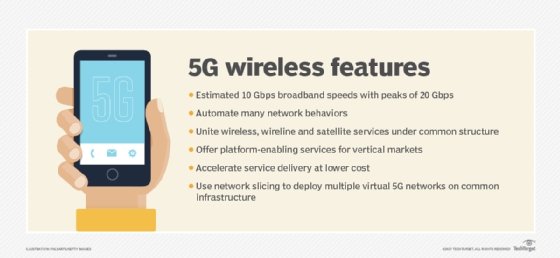
Getty Images
Finding the best cellphone plans for small businesses
A business mobile plan is common in the enterprise, but the picture isn't as clear for SMBs. If an SMB opts to purchase a phone plan, there are many options to choose from.
Connectivity between users is critical for any business and its ability to communicate the latest information about tasks and receive the latest updates from managers, so workers from disparate locations may need mobile devices to stay in constant communication.
SMBs have a lot of options when it comes to cellular plans that can fuel the necessary connectivity across users. While there are many similarities between different wireless carriers' programs and features, it can be useful to compare some of the most common mobile phone plans available to note the most relevant differences.
Why should SMBs have a dedicated phone plan?
There are many different answers to why SMBs should consider a dedicated business phone plan. At the end of the day, it comes down to the needs of the business. Certain business needs lend themselves more clearly to a mobile phone plan. These needs include the following.
Increased mobility of end-user workers
End users are no longer tied to a desk and need access to corporate applications and data across all locations. Users want to maintain productivity on the road, at home or wherever they are.
Employees might need to forward critical business files while out of the office, finish a project on a tight deadline while away from their usual workstation or communicate a critical decision to employees. Company-deployed mobile devices can help with all of these tasks and many more.
Personal and work separation
Many businesses face challenges when deciding between deploying business devices to end users that the business manages and allowing end users to perform business tasks on their personal device, personal phone number and cellular plan. The latter is referred to as BYOD and is a common approach to mobile devices. Allowing users to work from their own devices reduces the number of phones they need, provides hardware cost savings and generally enhances UX.
There is no right or wrong answer to this challenge, which often comes down to manageability and control. For example, does the mobile policy allow access to corporate applications on personal devices? If not, a corporate dedicated phone and plan would be the best option. Perhaps an SMB owner needs to control the type of applications that can be used on a mobile device -- for example, Netflix or YouTube could be disallowed on a device. An owner could also look to tightly control the experience of the device and lock it to a specific application for a single-use purpose as a kiosk. End users may not want to use their personal phone number for work-related activities and want that separation. These are great examples of when having a dedicated device and phone plan would be beneficial.
Comparing small business phone plans
Before getting into the differences between some of the most popular carrier plans, it is important to know the coverage area that users will be working within. In 2022, most carriers have a mature and extensive coverage map, but their support for 4G, 5G and 5G ultra-wideband (UWB) varies. A carrier is only as good as the area they support. To check coverage areas, look at the Federal Communications Commission carrier map, and consult each carrier about its range of coverage.
Verizon
Verizon is a well-known carrier with a strong reputation for solid and consistent data performance.
Key features that Verizon plans offer include the following:
- nationwide 4G LTE and 5G;
- recently deployed C-band 5G UWB;
- It is important to note that C-band -- or midband -- UWB is not the same as millimeter wave (mmWave) UWB. C-band gets higher speeds than 4G LTE and has wider deployment than mmWave at the time this publishes. However, C-band does not get the more significant 1 Gbps-plus speeds that its more advanced counterpart, highband mmWave, does.
- highband mmWave 5G UWB deployment in specific areas and growing;
- 5G business internet and fiber as additional options for office and in-home connectivity;
- Dedicated SMB and Enterprise plans and support;
- shared pooled data for businesses that don't need unlimited plans for every device; and
- bundles with advanced security and mobile device management with some of their plans for complete mobile management and support.
Verizon offers different options for small business plans with its Unlimited tier being one of the most used. This plan includes the following:
Business Unlimited Start 2.0 Business Unlimited Plus 2.0 Business Unlimited Pro 2.0Starting price$30 per line per month$35 per line per month$45 per line per monthKey features that the bundle offers
- nationwide LTE/5G
- filters for blocking spam
- unlimited minutes and texting
- all features of the Start-level plan
- 5G UWB
- business mobile security features
- 100 GB premium access to data during peak hours
- all features of the Plus-level plan
- unlimited premium access
- exclusive sales prices for tablets
| Business Unlimited Start 2.0 | Business Unlimited Plus 2.0 | Business Unlimited Pro 2.0 | |
| Starting price | $30 per line per month | $35 per line per month | $45 per line per month |
| Key features that the bundle offers |
|
|
|

AT&T
AT&T is another one of the big three network providers, and similar to Verizon, it offers comprehensive and mature coverage and reputation.
Key features that AT&T plans offer include the following:
- nationwide 4G LTE and 5G coverage;
- C-band 5G UWB;
- highband mmWave 5G deployment in specific areas;
- 5G business internet and fiber as additional options for office and in-home connectivity;
- Dedicated SMB and Enterprise plans and support; and
- shared pooled data for businesses that don't need unlimited plans for every device.
AT&T offerings include Business Unlimited and some per-gigabit tiers, with Unlimited being the most common, and includes the following:
| Business Unlimited Starter | Business Unlimited Performance | Business Unlimited Elite | |
| Starting price |
$30 per line per month (6+ lines) |
$35 per line per month (6+ lines) |
$40 per line per month (6+ lines) |
| Key features that the bundle offers |
|
|
|
T-Mobile
T-Mobile is the newest of these three options on the business side of mobile, and similar to its consumer side, it offers lower costs than its competitors. T-Mobile boasts broader coverage compared to Verizon and AT&T but doesn't account for cellular band coverage for 4G and 5G cellular speed. This must factor into any business evaluation.
T-Mobile has made a lot of investment into expanding its coverage and speed, and its acquisition of Sprint helped boost its 4G and 5G footprint.
Key features that T-Mobile plans offer include the following:
- nationwide 4G LTE and 5G coverage;
- expanded coverage areas, speed and footprint after the acquisition of Sprint;
- in-flight text and data;
- Microsoft 365 Business licenses; and
- in-home and business 5G internet.
T-Mobile lacks 5G highband mmWave. While mmWave is still in its infancy and does not have wide adoption, SMBs in an area with mmWave or that are looking for a plan that supports it should keep this in mind. T-Mobile currently only supports midband and lowband 5G. The perks of T-Mobile plans include the following:
| Business Unlimited Select | Business Unlimited Advanced | Business Unlimited Ultimate | |
| Starting price |
$25 per line per month (pricing for 6 lines) |
$30 per line per month (pricing for 6 lines) |
$40 per line per month (pricing for 6 lines) |
| Key features that the bundle offers |
|
|
|
Are data aggregation services good for SMBs?
Often, an SMB's needs may not perfectly fit within a carrier's unlimited and per-gigabit plans and programs. SMBs could even need international coverage and may have to manage multiple carrier contracts across different countries. It is in these scenarios that data aggregation companies may be a better fit.
Carrier vs. data aggregation services
Data aggregation companies purchase data from all the leading carriers and enable customers to buy plans from them, which are agnostic of the carrier. Additionally, data aggregation companies such as Kajeet, Globalgig and MetTel can give customers more flexibility with how they handle data consumption and needs with pooled flexible data packages that also can roll over.
A great example of when this is a good idea is if customers only need a few hundred megabits of data for a single-purpose use case, like an IoT device reporting back data from its sensors. Purchasing a flexible data package from a data aggregation partner can be more cost-effective than a locked-in, per-gigabit contract from a carrier. However, some carriers offer lower-tier IoT packages.
Data aggregation vendors can also help the ease of managing multiple national and international lines. While many carriers' plans include international call, text and data, determining if that carrier has coverage in all the required areas can be complex. This is where a data aggregation company can help; many of them work with most international carriers, making carrier-hopping much easier for international travel and business. This gives the SMB a single pane of glass to manage national and international contracts.
One of the biggest draws of these types of services is the ability to layer additional security and control. For example, Kajeet has a software platform called Sentinel that gives businesses tools such as filtering and limiting web traffic and activity, turning video streaming on and off, blocking specific sites, and turning data on and off based on policy. Education customers are active users of these companies and services for managing and filtering traffic on student devices.
Does your SMB need a dedicated mobile plan?
With all this information in mind, the question you need to ask is whether your SMB needs a dedicated mobile plan. Of course, there is no universal right or wrong answer there, and it is heavily dependent on each SMB's business needs. Here are some takeaways to consider:
- Does the current mobile policy allow corporate access on personal devices? If so, do you need to pay a stipend to end users for work-related use on personal devices and mobile plans?
- How much management and control do you need on devices? For example, are you concerned about the abuse of mobile data with items such as personal streaming and other activities, or do you need to tightly secure UX and data consumption on a device? If so, a corporate data plan may be a better option.
- Do your end users need and want a separation of work and personal files, apps and data? Do your end users want a dedicated phone number for work-related tasks? If so, a dedicated corporate line may be an option to consider.
- Do you have end users that need to travel internationally for business? A dedicated corporate phone plan may be better for managing those contracts.








